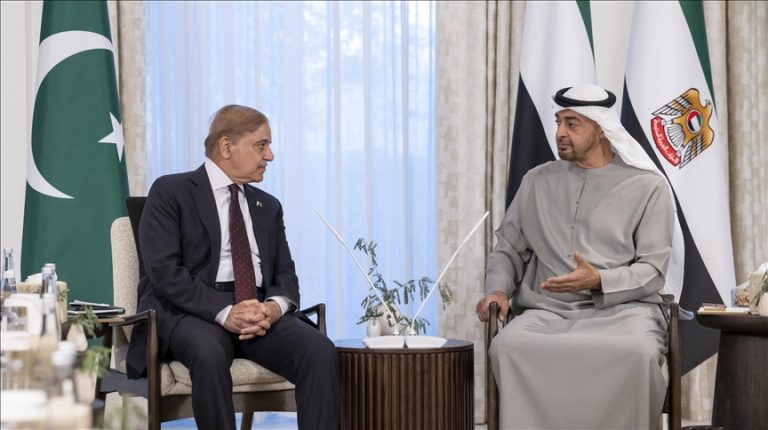
My message to the Indian leadership and Prime Minister Narendra Modi is that let us sit down on the table and have serious and sincere talks to resolve our burning issues – PM Shehbaz
Aamir Latif
KARACHI, Sindh
Pakistan’s Prime Minister Shehbaz Sharif has called for a third-party intervention to resolve the lingering Kashmir dispute with archrival India, urging the United Arab Emirates (UAE) to play a role.
In an interview with Al Arabiya news channel aired on Tuesday, Sharif said the oil-rich Gulf state, which has close diplomatic and economic ties with New Delhi and Islamabad, can play an “important” role in bringing the two nuclear-armed neighbors to the table.
“My message to the Indian leadership and Prime Minister Narendra Modi is that let us sit down on the table and have serious and sincere talks to resolve our burning issues, such as Kashmir,” said Sharif, who came to power in April last year after a successful no-confidence vote against his predecessor Imran Khan.
“It is up to us whether to live peacefully and make progress or fight with each other, and waste time and resources. We have three wars with India, and they have only brought more misery, poverty, and unemployment to the people,” he said, citing three full-fledged wars between the two countries (1948, 1965, and 1971), two of which were over Kashmir.
“We want to alleviate poverty, achieve prosperity, and provide education, health care, and employment to our people, and not waste our resources on bombs and ammunition … that is the message, I want to give to PM Modi,” he added.
Criticizing the “worst human rights” violations in Indian-administered Kashmir, Sharif warned that “we are nuclear powers, armed to the teeth, and if God forbid a war breaks out, who will live to tell what happened.”
Pakistan and India have long been embroiled in a slew of air and land disputes, primarily over the former princely state of Jammu and Kashmir, which remains a thorny issue impeding improved relations between the two neighbors.
Their frosty relations have already reached a new low following India’s repeal of Jammu and Kashmir’s long-standing special status in August 2019.
However, the two neighbors agreed in 2021 to uphold the 2003 cease-fire along the Line of Control (LoC), a 724-kilometer (450-mile) military control line that divides the disputed Indian and Pakistani-governed parts of Kashmir.
The UAE has had a role in brokering the cease-fire, which was followed by a letter exchange between the two premiers, as well as unconfirmed reports of “backdoor” contacts to defuse the escalating tensions.
Nonetheless, Islamabad reiterates that normalizing relation with New Delhi is contingent on the review of the Aug. 5, 2019 decision and the ultimate resolution of the Kashmir dispute.
‘Third-party mediation is best idea’
Abdul Basit, a former Pakistani High Commissioner to New Delhi, backed Sharif’s idea, saying that the two neighbors have lost “bilateral space,” leaving it up to a “third party” to intervene.
Basit, who served as Islamabad’s top diplomat in India from 2014 to 2017, told Anadolu that the UAE and Saudi Arabia are in a “better” position in comparison to Pakistan’s long-time ally, the US, to persuade New Delhi to come to the table.
“The game is gone out of hands for both Pakistan and India since they have no bilateral space at the moment. Therefore, this (Kashmir) issue can only be resolved through third-party mediation, whether in Saudi Arabia or the UAE,” he insisted.
“But, this exercise should be (conducted) through backdoor channels until the two sides reach a conclusion or understanding,” he added.
Nonetheless, he acknowledged that convincing New Delhi, which has repeatedly rejected a third-party mediation on the ling-smoldering dispute, will be difficult.
“The big question is whether India will be willing to accept third-party intervention or not. It’s New Delhi whose consent is essential for a third-party backdoor mediation because the (Kashmir) issue has been created by itself,” he remarked.
“It’s a long and complicated path. It’s not going to happen anytime soon. But we have to work on it as we have no other option,” he said, adding that the UAE and Saudi Arabia are willing to play a role, considering their massive economic and diplomatic engagements with both countries.
Basit believes that no Indian government will be able to reverse the 2019 decision, given the rise of Hindu nationalism in the world’s second most populous country.
“Therefore, we must find a solution in which Kashmiris (from both sides) are made part of the dialogue,” he reasoned.
Basit also urged Islamabad to appoint a full-time Special Representative for Kashmir, as it did for Afghanistan, to coordinate and move the long-stalled issue forward.
__________________
Aamir Latif is a senior journalist based in Karachi. He represents Turkish Anadolu Agency.
Courtesy: Anadolu Agency (Published on Jan 17, 2023)